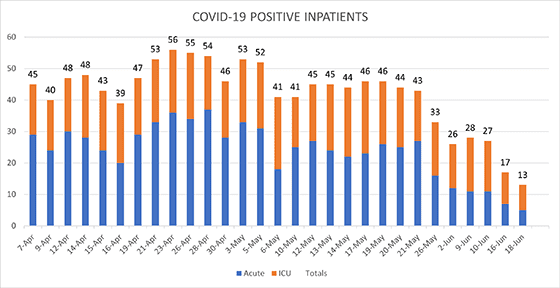Data Snapshot
UW Medicine Hospitals:

King County: The county reported 60 new positive cases and 0 new deaths on June 21.
Washington: The state reported 411,542 cases and 5,838 deaths as of June 20.
United States: The CDC reports 33,368,860 cases and 599,354 deaths as of June 21.
Global: WHO reports 178,360,849 confirmed COVID-19 cases and 3,869,384 deaths as of June 22.
Numbers update frequently, please follow links for most up-to-date numbers.
UW Medicine COVID-19 Vaccine Distribution Update
Total Vaccine Doses Administered: 346,292
- Total first dose: 168,155
- Total second dose: 178,137
As of June 16, 2021.
UW Medicine in the News
Crosscut: COVID vaccine research continues with help of trial participants
Featuring: Tia Babu and Anna Wald, Allergy & Infectious Diseases
“For the past few months, Dr. Tia Babu and Dr. Anna Wald, the UW principal investigator of the study, have been planning and conducting preliminary clinical trials of biotechnology company Gritstone’s CORAL vaccine. Gritstone’s “second generation” vaccine adds more defenses to the mix. It will — the manufacturer hopes — engage parts of the immune system some existing vaccines don’t reach. Researchers suspect the new vaccine will provide even broader immunity than those that have already received FDA approval and entered the market.”
WebMD: Help Avoid COVID, Injury as Kids Return to Sports
Featuring: Jonathan Drezner, Family Medicine
“Athletes should be mindful of other symptoms too when restarting exercise, especially after illness. It is ‘very important that any athlete with recent COVID-19 monitor for new symptoms when they return to exercise,’ says Jonathan Drezner, MD, a professor of family medicine at the University of Washington in Seattle. ‘A little fatigue from detraining may be expected, but exertional chest pain deserves more evaluation.’”
MyNorthwest: Covid updates: Fall, winter surge possible in US, warns UW modelers
Featuring: Ali Mokdad, IHME
“Despite COVID-19 cases trending downward in most states, modelers at UW’s Institute for Health Metrics and Evaluation have expressed concerns that declining demand for vaccinations over the summer, decreases in mask wearing, and increases in mobility could lead to a potential surge in new cases and hospitalizations by late-fall or early winter of this year. ‘Given that vaccination will likely run up against the limit of demand by early July, we expect there will be enough individuals who are susceptible to B.1.617.2 or P.1 [variant] infection to drive a late fall/winter surge which will slowly begin by late September,’ the IHME’s Dr. Ali Mokdad said Sunday. The IHME’s latest modeling indicates that daily infections could even begin to rise as soon as late August, with deaths increasing shortly after that.”
COVID-19 Literature Report
COVID-19 Literature Situation Report is a daily (M-F) newsletter put together by the Alliance for Pandemic Preparedness that provides a succinct summary of the latest scientific literature related to the COVID-19 pandemic.
Key Takeaways: COVID-19 Literature Situation Report June 15, 2021
- The incidence of all-cause mortality among residents of assisted living settings in the US between January and August 2020 was 17% higher compared to the same time period in 2019. Among the 10 states with the highest COVID-19 community spread, during that time period the incidence of all-cause mortality was 24% higher. More.
- COVID-19 vaccination among pregnant women was lowest among those aged 18-24 years (6%) and among Hispanic (12%) and Black women (6%) out of 22,197 pregnant women in the US identified in CDC’s Vaccine Safety Data Link as of May 8, 2021. Of those initiating vaccination 68% had completed either a 1- or 2-dose series. More.
- A third dose of a COVID-19 mRNA vaccine received a median of 67 days after the second dose was not able to elicit detectable anti-SARS-CoV-2 antibody responses in 53% of a cohort of solid organ transplant recipients (n=30). Prior to the third dose, 80% of participants did not have detectable antibody responses after completing the 2-dose vaccination series. More.
- SARS-CoV-2 infections caused by the B.1.617.2 (Delta) variant of concern were at increased risk of hospitalization (HR=1.9) compared to the B.1.1.7 (Alpha) variant, according to a whole population cohort study in Scotland, where the B.1.617.2 (Delta) has become the dominant variant. Estimated vaccine effectiveness 14 days after the second dose against infection was reduced against B.1.617.2 (Delta) compared to B.1.1.7 (Alpha) for the Pfizer-BioNTech (92% vs 79%) and Oxford-AstraZeneca vaccine (73% vs 60%). More.
COVID-19 Literature Surveillance Team, is an affiliated group of medical students, PhDs and physicians keeping up with the latest research on SARS-CoV-2 / COVID-19 by finding the newest articles, reading them, grading their level of evidence and bringing you the bottom line.
Read the latest report: June 18 | Weekly COVID-19 LST Report.
Tweet of the Week
https://twitter.com/UWMedicine/status/1405631843924336646
